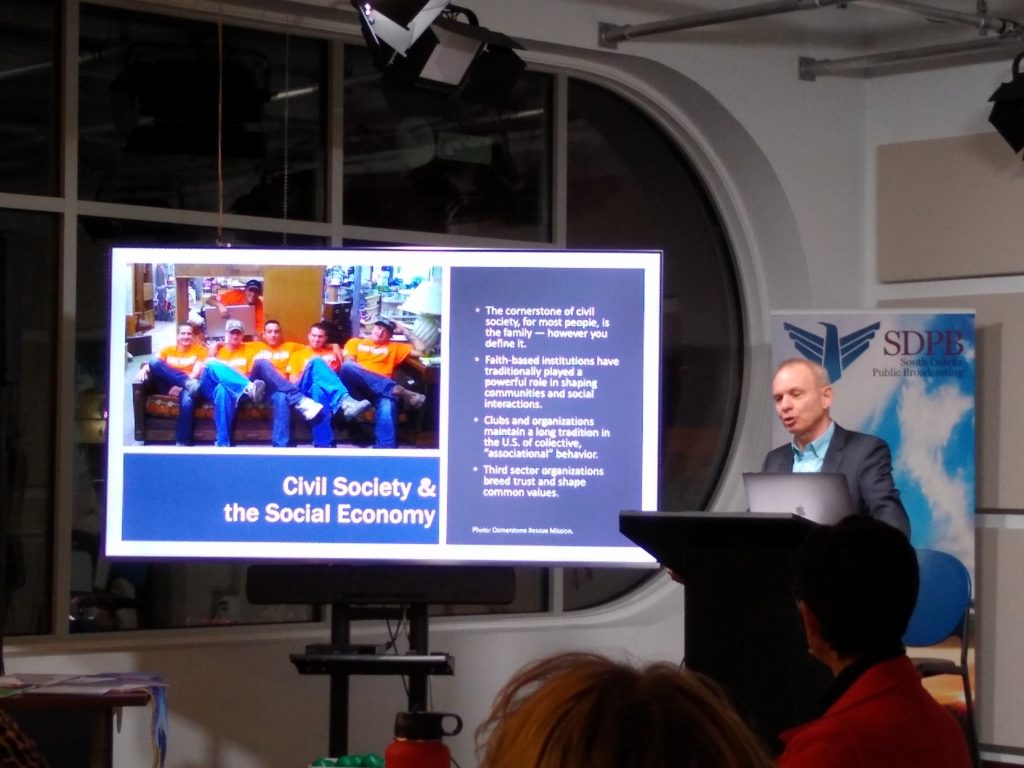During the spring of 2020, Vantage Point principal historian Eric Abrahamson made a series of presentations across the country as he explored the subject matter for his current book project, Profit for Good: How Philanthropy Fuels the Market Economy.
In January, Abrahamson served as the keynote speaker for a gathering of the Western South Dakota Association of Fundraising Professionals. In February, he traveled to John Hopkins University, where he presented the work to the American Capitalism Seminar, a working group of scholars who explore the intersections of business, economics, history, and social change from a variety of disciplinary perspectives. In March, he spoke to graduate students and faculty at the Indiana University Lilly School of Philanthropy. Later that month, he participated remotely at the 2020 Business History Conference, where he presented a paper taking on a small piece of the larger Profit For Good project entitled “Reputation, Social Capital, and the Industrialization of Credit: The Experience of One Mid-American City.”

Read the abstract from Abrahamson’s IU presentation below:
A fierce debate over the social and political consequences of rising income inequality is at the heart of the presidential campaign for 2020 and is likely to be a critical issue for Congress no matter who wins the presidency. Recent books like Winners Take All (Anand Giridharadas), Decolonizing Wealth (Edgar Villanueva), Just Giving (Robert Reich) and The Givers (David Callahan) have criticized the rich and pointed to the self-serving nature of philanthropy, suggesting that it is fundamentally corrosive to American democracy. Lost in this debate is the important role that philanthropy and social investment play in driving innovation and opportunity in the American economy. This paper will serve as the introduction and overview for my book-in-progress: Profit For Good. The book will highlight the role that philanthropy has played in developing talent, new knowledge, and physical infrastructure to support innovation and economic growth over the last century. Just as important, it will show how philanthropy in the United States has built and sustained institutions critical to the development of social networks and social capital, cultivating values, attitudes, and levels of trust that spark financial investment and feed the marketplace for goods and services, as well as ideas.
Yet as sociologist Daniel Bell warned fifty years ago, the balance wheel between philanthropy and the market in the United States is threatened by the postindustrial expansion of capitalism. In disparate arenas ranging from the domestic to the political, systems of social exchange that strengthened the fabric of civil society in the past are being dissolved by the substitution of depersonalized or anonymized market transactions that do little to bind people to the larger culture or society as a whole. Thus, paradoxically, the market’s expansion into the social economy now threatens to unravel the civil society that fueled its growth.
Profit for Good explores these tensions in a series of historical chapters, spanning roughly 150 years, that look at the relationship between civil society and economic growth, changing American attitudes toward the separation of non-profit from for-profit activities, and the evolution of the regulation of philanthropy and the market in the public interest.
